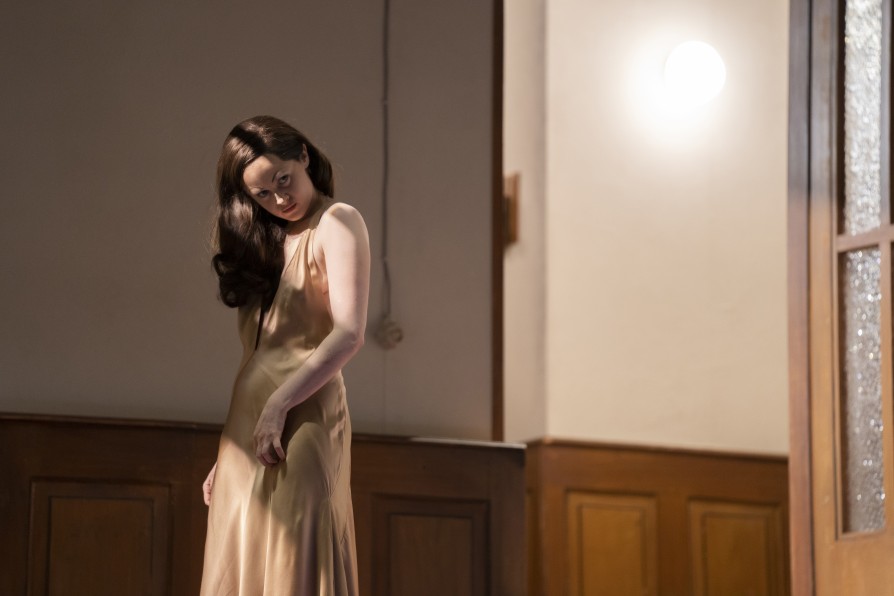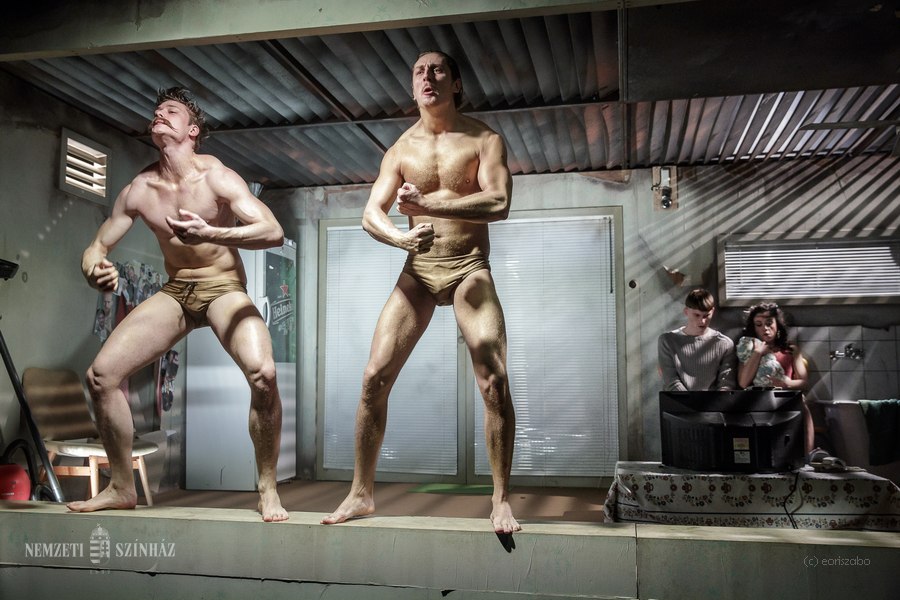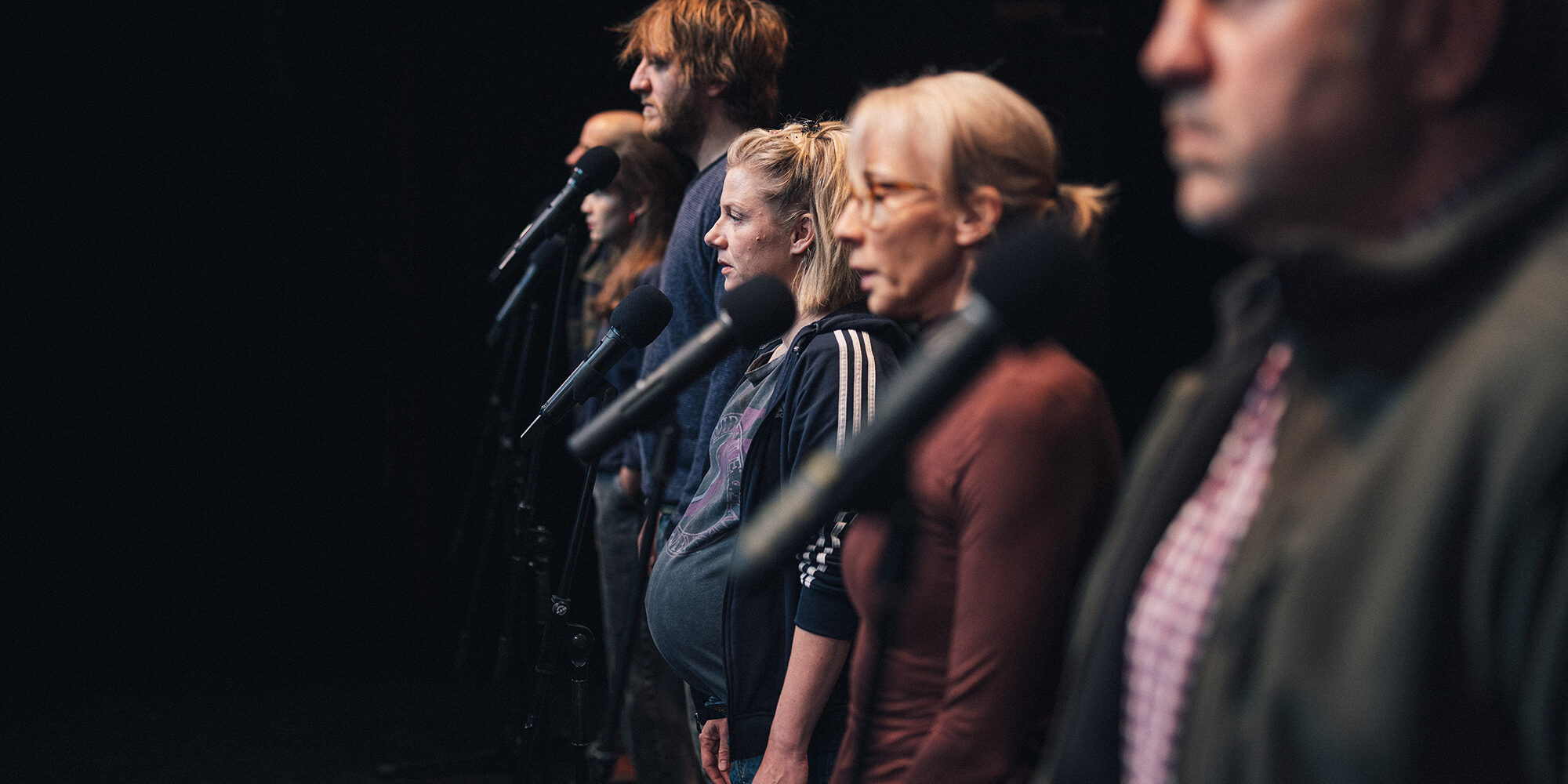The 49th INFANT festival took place at the Serbian National Theatre in Novi Sad from 10th -13th September. Borisav Matić reports on this year’s programme, including work by Mateja Koležnik and Žiga Divjak.
The INFANT festival marks the unofficial start of Novi Sad’s theatre season, but in a way, the festival is a prelude to the BITEF festival, which takes place in Belgrade later in September. Although the two festivals are separately organized and there are differences between them – BITEF has a much bigger programme and a more international audience – the two events share a similar approach to theatre, evident in INFANT’s acronym, the International Festival of Alternative and New Theatre.
In the context of INFANT “alternative” is a loosely based term. Judging by recent selections, it means performances that strive to be aesthetically innovative and deal with contemporary social problems, defining the last term as broadly as possible. Paradoxically or not, the accent is on institutional theatres – all four of this year’s performances came either from national or city theatres, including one of the most prominent European theatres, the Burgtheater from Vienna.
The festival selector Aleksandar Popovski, a theatre director well-known for his productions across the region – chose two new interpretations of classical plays (Miss Julie and Woyzeck), a show based on a contemporary Slovenian text by Katarina Morano (Sediment) and a blend-dramatization of several Franz Kafka’s literary works (Kafka Machine). All four performances together explore social issues and existential problems that span from personal to political and back. We bring you a closer look at each performance.
Miss Julie
The opening performance was Burgtheater’s Miss Julie, directed by Mateja Koležnik, one of the leading Slovenian directors who mostly works in German-speaking counties.
While adapting August Strindberg’s play, Koležnik and the dramaturg Gotz Lineweber preserved the story in its entirety, with only a few interpretative twists. Koležnik directs the play in a realistic manner, flirting with Strindberg’s naturalism, which many German-speaking critics found provocative and retro. Ironically, this approach was received as quite conventional in Novi Sad as Serbian dramatic theatre is mostly stuck in realistic styles of acting, with only occasional “experimentations” into contemporary acting methods.
Koležnik achieves this realism thanks to the actors Sarah Viktoria Frick (Kristin), Maresi Riegner (Julie) and Itay Tiran (Jean) who meticulously bring the characters to life with all their emotional oscillations. The set design (Raimund Orfeo Voigt) and costumes (Ana Savić Gecan) are also incredibly detailed, representing a timeless high-class milieu. An obvious shift from the play is that the story does not take place in the kitchen, but in the bathroom of the count’s house. Koležnik, however, plays around with the convention of realistic theatre, putting the set design and the actors in a box that’s sealed with a literal fourth wall, a transparent glass.
There are a few clever twists in this adaptation and the most notable one comes at the end. At the end of Strindberg’s play the count, Julie’s father, returns to the house and Julie is so desperate that she decides to commit suicide. But in Koležnik’s version, everything returns to normal after the count’s return – Julie and Jean head off to their rooms, Kristin cleans up the messy bathroom and the crazy night of sexual passion, quarrels and fights is left behind. Another intervention is that Kristin’s character – a minor character in the original – gets much more time in this adaptation. When Julie and Jean, Kristin’s partner, are having sex in the hall behind the closed glass door, Kristin is hiding in the bathroom and the audience sees the same disturbingly voyeuristic scene as she does.
It is a shame though that the production doesn’t tackle gender dynamics – so central to this story – in a more contemporary way. Julie and her mother (only mentioned in the story) are preserved as characters who ruin the lives of men around them with their progressive, feminist ideas. With this, Strindberg’s anti-feminist opinions are left untacked. One can rightfully assume that Koležnik is more interested in playing with the formal aspects of Miss Julie than with important social issues that the play uncovers.

Miss Julie – photo: Susanne Hassler-Smith
Woyzeck
The second night of INFANT brought another interpretation of a 19th-century classic, Georg Büchner’s Woyzeck in the production of the National Theatre in Budapest.
Büchner’s play – written in fragments full of existential angst – is a forerunner of expressionism and it puts at its center the topic of an ordinary man facing a repressive society. The play is also a favourite of some contemporary socially engaged authors since the story of Woyzeck’s struggle in the early capitalist society can easily communicate with the audience that lives in the still exploitative late capitalism.
The director of the show Attila Vidnyánszky and the dramaturg Miklós H. Vecsei make the connection to contemporary society even stronger by moving the story to the present. Woyzeck, his wife and their baby now live in a small crummy apartment (set design: Kinga Vecsei Réta) leading empty lives together with their neighbors.
The central focus of the show is on how modern-day capitalism creates cheap spectacle for impoverished masses, so they stay put in their positions. At the center of Woyzeck’s apartment is a TV set that not only hypnotizes Woyzeck’s wife but creates a whole alternative reality that gradually takes over the show. Absurd characters come out of the TV into Woyzeck’s reality and they perform various forms of wild “entertainment”, from partying, dancing and singing to fights and displays of toxic masculinity. The characters that appear from the TV are at the same time Woyzeck’s neighbors, suggesting that they fell under the spell of the mass spectacle and are now its active participants, together with Woyzeck’s wife who cheats on him with one of the characters.
In this adaptation, Woyzeck is a silent, introverted observer who refuses to participate in this reality TV (or TV reality). He helplessly watches the grotesque unfolding in front of his eyes, often being a victim of violence, until he cracks and (spoiler – not spoiler) murders his wife. Márk Nagy skillfully plays the lead character by showing how Woyzeck gradually becomes more disturbed and sicker under the layer of apparent calmness. His acting is pure contrast to the rest of the ensemble who expressively brings to life the loose and riotous atmosphere.

Vojcek Photo: Eöri Szabó Zsolt
Sediment
While Mateja Koležnik and Attila Vidnyánszky brought us two new interpretations of classics, the third night of INFANT brought Sediment, a contemporary play written by Katarina Morano and in production of the City Theatre of Ljubljana. The show is directed by one of the most exciting young theatre directors in Slovenia, Žiga Divjak whose show Crises will have a premiere at the upcoming BITEF festival. Morano and Divjak are long-time collaborators who teamed up this time to bring us a more personal kind of engaged theatre that deals with existential questions.
Sediment takes place in a Slovenian family after the death of their matriarch (Mirjam Korbar). Korbar enters the stage in a hospital nightgown performing a monologue about her character’s relationship with her mother – a cold and distant relationship where the display of emotions almost never happened, yet love between them was somehow always implied. Korbar sits in a box at the center of the stage within which is an incredibly realistic and detailed apartment with late-Yugoslav furniture and decorations, including a living room, a kitchen and a bathroom (set design: Igor Vasiljev). After the mother dies and Korbar leaves the stage, the rest of the actors dismantle the apartment bit by bit, object by object until, by the end of the performance, the whole apartment is gone as if it never existed.
The rest of the show is a polyphony of life stories of family members who live uneasy emotional relationships with each other, inheriting alienation from their matriarch. From family quarrels to reminiscences of better times to personal insecurities, Sediment is a tangle of monologues and dialogues that actors tell straight to the audience through microphones that stand in a row at the front of the stage, the lack of interaction between them only underlining the alienation. Some segments are too long and the show occasionally loses focus, as if a decisive dramaturg was needed to condense the stories, but there are some exceptional moments that show the existential dread a person can have, either in a funny or a stark way. The monologue of Tomaž (Lotos Vincenc Šparovec) comes to mind as a humorous example since he makes thoroughly researched guesses about how many more years he will live and if he will have enough time to pay back his housing loan.
As the Slovenian critic Evelin Bizjak notes, unlike Divjak’s other shows that are more pro-actively socially engaged, Sediment settles with confronting the audience with pessimistic melancholy that’s a result of modern-day alienation.
Kafka Machine
The show that closed INFANT and gave, thematically speaking, a fitting conclusion to the exploration of existential anxieties and social injustices is Kafka Machine, a production from the festival host, the Serbian National Theatre.
The director Veljko Mićunović and the dramaturg Kata Djarmati adapted several of Franz Kafka’s literary works into a dramatic form – The Trial, The Castle, Kafka’s diaries and some of his letters, but the authors also used some motives from the writer’s short stories. The result is a singular narrative that follows the main character K. who’s been mysteriously detained and put on trial without sufficient explanation. The show thematizes, as Kafka’s works also do, the problems of authoritarianism, the bureaucracy that devourers ordinary citizens and the unmeaningful lives that people lead in these circumstances.
Veljko Mićunović directs the show in the style of a dark fairy tale as if the protagonist K. lost himself in a dreamlike labyrinth of bureaucracy. Besides the cosmetic elements of the show that create an oneiric atmosphere (the stage being covered in snow-like substance and the occasional fog), the main artistic choice that points out the protagonist’s alienation is, similar to Woyzeck, the difference in the styles of acting between the main actor and the supporting roles. Aljoša Djidić plays K. realistically and empathetically while the other actors bring to life the supporting characters with uniformity and simpleness since they are not playing true human beings but executors of the system.
There is a dramaturgical problem that runs through the whole show – the consolidation of so many different literary works created an occasional sense of (unwanted) confusion and it was hard to follow all the storylines. An average viewer probably gave up mid-performance of following the role of the majority of supporting characters because there are so many of them. However, the show is not complete confusion because of the simplicity of its concept – the main character in flesh and blood and the others who are bureaucratic pawns who can function as one entity in the viewer’s observation. But this concept is also limiting because it presented Kafka’s idea in the simplest form, without a chance to go deeper.
Main image: Sediment: Photo: Peter Giodani
For more info, visit: INFANT.rs
Further reading: Interview with Mateja Koležnik: “Art is a tool to open people’s minds”
Further reading: Interview with Žiga Divjak: “We have to completely change our value system”
Borisav Matić is a critic and dramaturg from Serbia. He is the Regional Managing Editor at The Theatre Times. He regularly writes about theatre for a range of publications and media.
He’s a member of the feminist collective Rebel Readers with whom he co-edits Bookvica, their platform for literary criticism, and produces literary shows and podcasts. He occasionally works as a dramaturg or a scriptwriter for theatre, TV, radio and other media. He's the administrator of IDEA - the International Drama/Theatre and Education Association.








